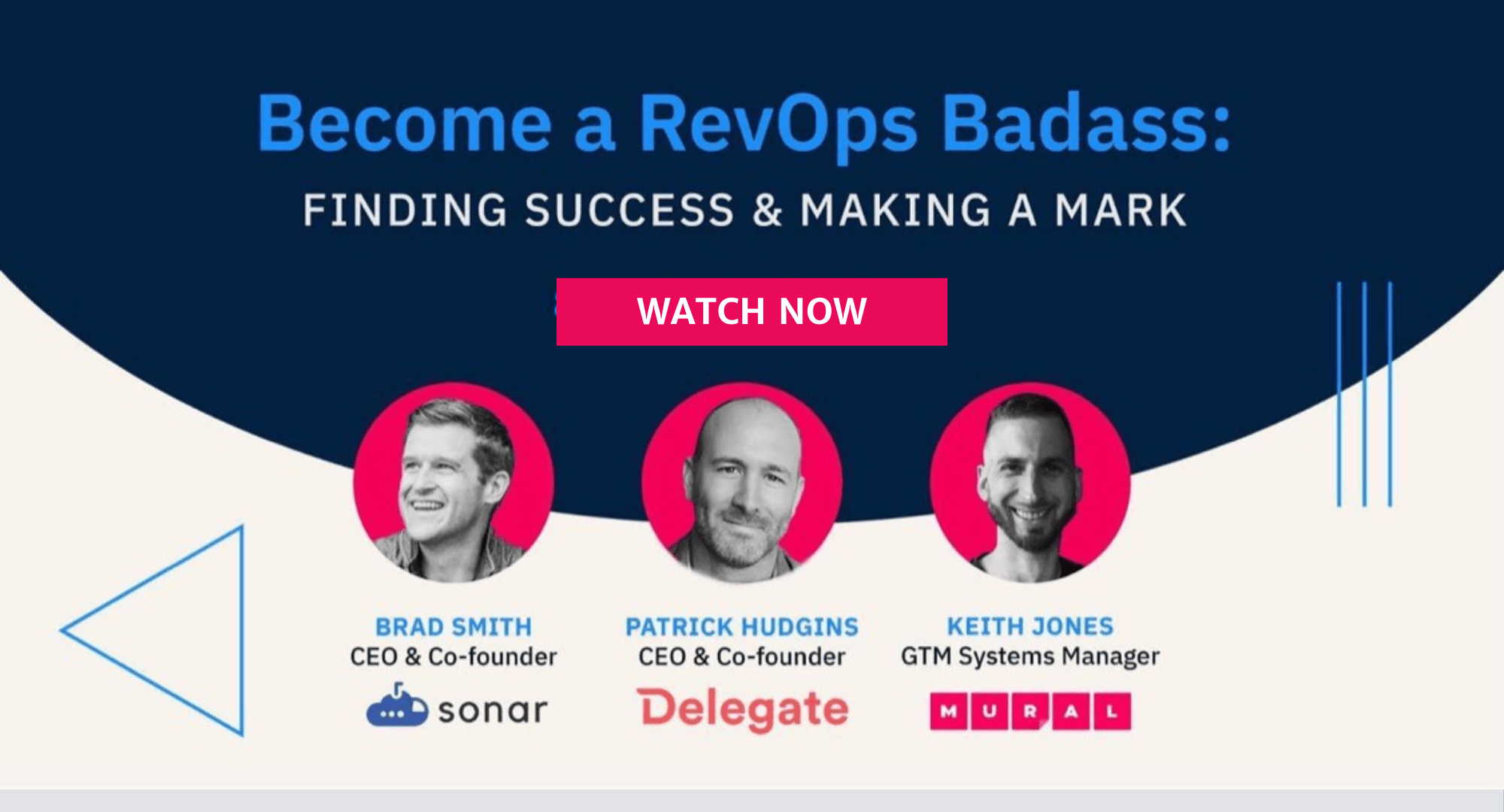Webinar Recap: Sh*t Every Ops Leader Needs to Know
On Thursday, September 17, sh*t happened. Not just any sh*t though, we talked about the sh*t every ops leader needs to know in a webinar co-hosted by Arovy CEO Brad Smith and Go Nimbly VP of Marketing Lorena Morales. Brad and Lorena did not disappoint, covering everything from the importance of RevOps to prioritizing relationship-building and understanding how change management supports cross-functional certainty through periods of change.
Missed the live show? Not to worry, we're recapping all of the important details in this blog post, so you can dive into the customer experience, the importance of change management, and the crucial role that RevOps team structures play. And if you'd rather just see the video, you can do that, too scroll to the bottom of the page to watch that sh*t in full.
Now, first things first: What is RevOps, and why do we need it?
RevOps, by definition, is a methodology that combines your go-to-market operations functions into one team to drive strategy, improve the customer experience, and increase revenue.
“At Go Nimbly, RevOps means that every single person in your operations team is looking at the same metric, which is revenue, and that should be your North Star," explained Lorena. “The ultimate purpose is to create a more gapless customer experience because that should be the focus of every single company: your customer. The days when product lead revenue are gone you shouldn't be driving based on product. You should be driving based on customers. So that's why this model, revenue operations, is crucial.
“Absolutely,"Brad agreed. “And you nailed it when we think of the topic for this today is going to be methodology...Why is this important? We're gonna be talking so much about the why ...We're going to dive into the methodology of what we're looking to solve for.
A Look Inside RevOps Teams
Do titles matter? The short answer is: not really.
“I've never been the biggest fan of titles," said Brad.“You know, one thing that we all know to be true, depending on the size of your company; depending on what vertical you're in, some of these titles might have different meanings. At the end of the day, I think from a methodology of RevOps titles, they don't really mean sh*t.
What does matter are the skillsets that your team possesses. RevOps team members should have skills that revolve around strategy, tools, enablement, and insights. These skillsets should be evenly distributed, and each operator should have some knowledge in two or more of these categories. Avoid having too many specialists and generalists are a great way to fill any skill gaps that may arise.
“When we look at the skills that are involved, one of the unique things that we've seen as this evolves is team growth," Brad explained. “You know, five years ago, I think a lot of companies were looking for someone to run RevOps, and we were seeing just a single person to do this. And now, as we peel back the layers of the onion, what we find is that multiple people are needed to fill the required skillset."
Now we know what you're thinking: What if there are skill gaps in my team, and how do I fill them?
First, start by assessing your baseline at the company, team, and individual levels. Then, look at trends in your pipeline to identify areas of operational weakness. Talking to your revenue team and also to your customers can provide insight into where other gaps might exist. To fill these deficiencies, you can do things like enforce collaboration and focus on improving process, communication, and documentation.
“People often ask me, “how do I structure my people, where do I put them, who owns what?" said Lorena. “But the truth is, it shouldn't be that complicated. The main thing is you need to have a unified team. So let's define, first of all, who is your RevOps team, and who is your revenue team? These are two different things; RevOps consists of marketing ops, sales ops, and customer success ops. Nowadays, we're starting to see companies being more strategic, which for me is, is an absolute game-changer for the customer."
RevOps and the Break Down of Traditional Silos
Breaking down silos allows teams to work together to reach unified goals. Yet despite these benefits, many companies still feel a disconnect. Team silos, technology silos, and communication gaps will ultimately hinder progress.
“Forming silos is only going to generate a huge team of specialists," Lorena said.
RevOps works to break them down. Your sales, marketing, revenue, and customer success teams should be working together not separately. Do you have the talent that can make updates and see how those changes impact the entire team? Do your cross-functional teams have a scalable process in place to keep your business operations running smoothly? They should be able to showcase and collaborate on changes throughout your organization with ease and efficiency.
Best practices to do so include:
- Holding weekly cross-functional, momentum-based meetings
- Mapping your customer journey from end-to-end
- Building a strategic operational roadmap
- Paying attention to your data integrity and visibility
- Seeking out perspectives from outside your own function or role.
Getting Leadership Buy-In
Getting buy-in from leadership is essential to the success of your RevOps strategy. Driving adoption starts from the top, down. To do this, first establish the “why" behind it. Then, identify the “who" of the decision-makers and true agents of change. Next, set clear and honest expectations. Finally, this will drive adoption from the top down.
“How do we get leadership buy in? Because the truth is that when teams are aligned, they generate 38% more revenue at 27% less time," said Brad. “It's so important to make sure that everyone at a company is aligned so that we can reach our full organizational potential."
Measuring the ROI of RevOps
“Companies that are aligned on their roadmap and strategy grow 12 to 15 times faster than their peers and are more profitable, according to Sirius Decisions," said Lorena. “Why is this? Well, it's not a coincidence, right? Like if you start doing what Brad and I have been talking about, you're going to start to see your velocity rates getting higher. Your conversion rates are going to stay the same or they are going to go higher as well. So what is the result of that revenue? Hopefully profits at some point."
Ultimately, you'll want to define what success looks like for your company and pay attention to holistic revenue goals. Be mindful about setting aside vanity metrics, but also know what data points you need to be collecting in order to gauge momentum and progress towards those goals. Did you learn some sh*t? Watch the full webinar video here for even more RevOps team info:


.webp)






